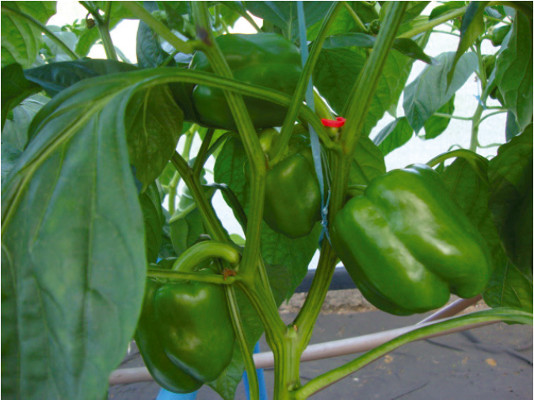Agua salobre: una opción para la producción de <i>Capsicum annuum</i> hidropónicos en flujo laminar de nutrientes minerales

Resumen
Las plantas de pimiento dulce se cultivaron utilizando un sistema hidropónico Nutrient Film Technique (NFT). Su objetivo fue evaluar el efecto del uso de agua salobre en la producción de fruta. El experimento se llevó a cabo en un diseño de bloques al azar con siete tratamientos y cinco repeticiones. La conductividad eléctrica del agua fue 0,29; 1,39; 2,75; 4,49; 5,90; 6,76 y 7,09 dS m-1 en los tratamientos; también, esta agua se usó tanto para la preparación de la solución de nutrientes como para la reposición de la evapotranspiración del cultivo. Los parámetros de la planta: longitud del fruto, número de frutos por planta, peso medio del fruto, peso total de las frutas por planta y la relación longitud/diámetro del fruto se evaluaron 69 días después del trasplante. El uso de agua salobre con altos valores de conductividad eléctrica no interfiere directamente en la producción de chile dulce en los sistemas hidropónicos NFT, siempre que estos valores no excedan la tolerancia a la sal de pimienta dulce de 1,5 a 1,8 dS m-1.Palabras clave
Cultivo sin suelo, semiárido, protección del medio ambiente, reutilización del agua.
Biografía del autor/a
Adailton Conceição dos Santos
Campus Profª Cinobelina Elvas. Soil Science.
Citas
- Alves, M.S., T.M. Soares, L.T. Silva, J.P. Fernandes, M.L. Oliveira, and V.P. Paz. 2011. Strategies for use of brackish water in NFT hydroponic lettuce production. Rev. Bras. Eng. Agríc. Ambient. 15, 491-98. Doi: 10.1590/S1415-43662011000500009
- Albuquerque, F.S., E.F.F. Silva, J.A.C. Albuquerque Filho, and M.F.F.N. Nunes. 2011. Growth and yield of sweet pepper fertigated under different irrigation depths and potassium doses. Rev. Bras. Eng. Agríc. Ambient. 15, 686-94. Doi: 10.1590/S1415-43662011000700006
- Albuquerque, F.S., E.F.F. Silva, E. Bezerra Neto, E.R.A. Souza, and A.N. Santos. 2012. Mineral nutrients in fertigated sweet pepper under irrigation depths and potassium doses. Hortic. Bras. 30, 681-87. Doi: 10.1590/S0102-05362012000400019
- Arruda, C.E.M., N.S. Dias, F.F. Blanco, O.N. Sousa Neto, and M. Ferreira Neto. 2011. Bell pepper cultivation with brine from brackish water desalination. Rev. Caatinga. 24, 197-201.
- Ayers, R.S., and D.W. Westcot. 1985. Water quality for agriculture. FAO Irrigation and Drainage, Rome. Benoit, F. 1987. High-technology glasshouse vegetable growing in Belgium. Soilless. Culture. 3, 21-9.
- Cosme, C.R., N.D.S. Dias, A.D. Oliveira, E.M. Oliveira, and O.D. Sousa Neto. 2011. Hydroponic tomato production using reject of desalination in the nutrient solution applied at different stages. Rev. Bras. Eng. Agríc. Ambient. 15, 499-504. Doi: 10.1590/S1415-43662011000500010
- Chartzoulakis, K., and M. Bertaki. 2015. Sustainable water management in agriculture under climate change. Agric. Agric. Sci. Procedia. 4, 88-98. Doi: 10.1016/j.aaspro.2015.03.011
- De Pascale, S., C. Ruggiero, and G. Barbieri. 2000. Effects of irrigating pepper (Capsicum annuum L.) plants with saline water on plant growth, water use efficiency, and marketable yield. Acta. Hortic. 537, 687-95. Doi: 10.17660/ActaHortic.2000.537.81
- Dias, N.D.S., R.B. Lira, R.F. Brito, O.N. Sousa Neto, M. Ferreira Neto, and A.M. Oliveira. 2010. Melon yield in a hydroponic system with wastewater from desalination plant added in the nutrient solution. Rev. Bras. Eng. Agríc. Ambient. 14, 755-61. Doi: 1 10.1590/S1415-43662010000700011
- Ferreira, D.F. 2011. Sisvar: a computer statistical analysis system. Ciênc. Agrotec. 35, 1039-42. Doi: 10.1590/S1413-70542011000600001
- Furlani, P.R., L.C.P. Silveira, D. Bolonhezi, and V. Faquin. 1999. Hydroponic plant cultivation.: IAC, Campinas, Brazil. Kurunc, A., A. Unlukara, and B. Cemek. 2011. Salinity and drought affect yield response of bell pepper similarly. Acta. Agric. Scand. B. 61, 514-22. Doi: 10.1080/09064710.2010.513691
- Leonardo, M., F. Broetto, R.L.V. Boas, R.S. Almeida, and J.A. Marchese. 2007. Production of sweet pepper fruits in different saline concentrations. Irriga. 12, 73-82.
- Maciel, M.P., T.M. Soares, H.R. Gheyi, E.P. Rezende, and G.X. Oliveira. 2012. Production of ornamental sunflower with use of brackish waters in NFT hydroponic system. Rev. Bras. Eng. Agríc. Ambient. 16, 165-72. Doi: 10.1590/S1415-43662012000200006
- Maia, S.S.S., R.C.P. Silva, F.A. Oliveira, O.M.P. Silva, A.C. Silva, and W.S. Candido. 2017. Responses of basil cultivars to irrigation water salinity. Rev. Bras. Eng. Agríc. Ambient. 21, 44-9. Doi: 10.1590/1807-1929/agriambi.v21n1p44-49
- Marschner, P. (ed.). 2012. Marschner’s mineral nutrition of higher plants. Elsevier/Academic Press, London.
- Monteiro, M.T.M., V.F.F. Gomes, P.F. Mendes Filho, and F.V.A. Guimarães. 2009. Absorption of nutrients by seedlings of mycorrhizal pepper cultivated on substrate with coconut powder. Rev. Caatinga 22, 95-101.
- Navarro, J.M., C. Garrido, P. Flores, and V. Martínez. 2010. The effect of salinity on yield and fruit quality of pepper grown in perlite. Span. J. Agric. Res. 8, 142-50. Doi: 10.5424/sjar/2010081-1153
- Paulus, D., D. Dourado Neto, J.A. Frizzone, and T.M. Soares. 2010. Production and physiologic indicators of lettuce grown in hydroponics with saline water. Hortic. Bras. 28, 29-35. Doi: 10.1590/S0102-05362010000100006
- Santos Júnior, J.A., H.R. Gheyi, A.R. Cavalcante, S.D.S. Medeiros, N.D.S. Dias, and D.B.D. Santos. 2015. Water use efficiency of coriander produced in a lowcost hydroponic system. Rev. Bras. Eng. Agríc. Ambient. 19, 1152-58. Doi: 10.1590/1807-1929/agriambi.v19n12p1152-1158
- Sarmento, J.D.A., P.L.D. Morais, M.L.B. Almeida, O.N. Sousa Neto, and N.S. Dias. 2014. Quality and conservation of lettuce grown with desalination waste. Rev. Caatinga 27, 90-7.
- Semiz, G.D., D.L. Suarez, A. Unlukara, and E. Yurtseven. 2014. Interactive effects of salinity and N on pepper (Capsicum Annuum L.) yield, water use efficiency and root zone and drainage salinity. J. Plant. Nutr. 37, 595- 610. Doi: 10.1080/01904167.2013.867985
- Soares, T.M., S.N. Duarte, E.D.F. Silva, and C.A. Jorge. 2010. Combination of fresh and brackish waters for hydroponic lettuce production. Rev. Bras. Eng. Agríc. Ambient. 14, 705-14. Doi: 10.1590/S1415-43662010000700004
- Soares, H.R., E.F.F. Silva, G.F. Silva, E.M.R. Pedrosa, M.M. Rolim, and A.N. Santos. 2015. Lettuce growth and water consumption in NFT hydroponic system using brackish water. Rev. Bras. Eng. Agríc. Ambient. 19, 636- 42. Doi: 10.1590/1807-1929/agriambi.v19n7p636-642
- Soares, T.M. 2007. Use of brackish water in the cultivation of lettuce in hydroponic system NFT as an agricultural alternative, consistent with the Brazilian semi-arid region. Doctoral thesis. Escola Superior de Agricultura “Luiz de Queiroz”, USP, Piracicaba-SP, Brazil.
Descargas
Los datos de descargas todavía no están disponibles.
